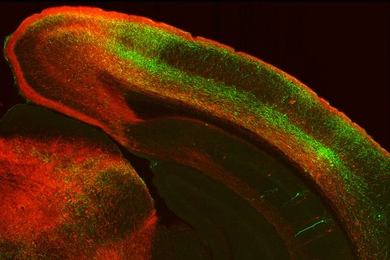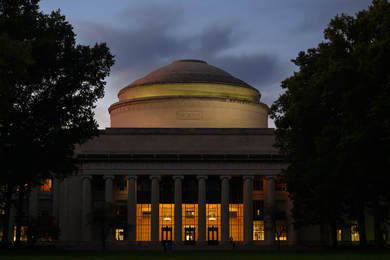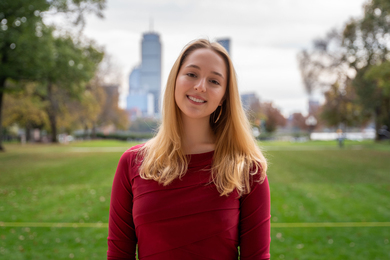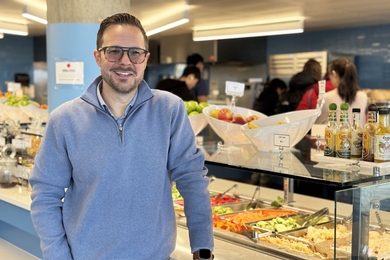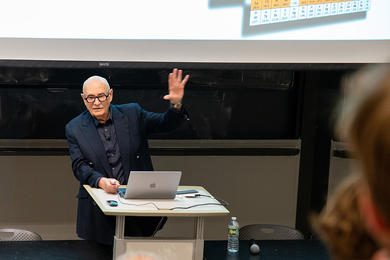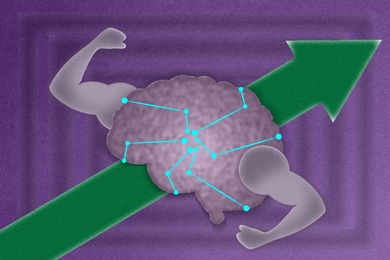MIT is working closely with the Massachusetts Department of Education to develop a new program through which MIT students can become certified to teach math and science in grades 6 through 12.
The MIT Teacher Certification Program, which will be sponsored jointly by the Office of the Dean for Student Affairs and the Department of Urban Studies and Planning, is expected to be registered by the State Bureau of Teacher Certification during the 1992-93 academic year.
"I am very enthusiastic about the MIT approach because it combines the best of academia and real-world schools in one exciting model," said Dr. Julie Altshuler, director of teacher preparation and program approval at the Massachusetts Department of Education.
Interested students can begin work towards certification by enrolling in a new course this fall, Introduction to Issues in Teaching and Learning (11.124), taught by Professors Susan Carey of brain and cognitive sciences and Jeanne Bamberger of music and theater arts, coordinators of the new program. (The course is a prerequisite for another course in the program to be offered next spring.)
Students in the new program will complete certification requirements-six courses plus 150 hours of supervised practice teaching-while majoring in engineering or science. Professor Bamberger says that "in future years we hope to extend the fields of specialization to include humanities, arts, and social studies as well."
Until recently MIT students interested in teaching had to complete their certification through the Wellesley Education Department, which offered a number of required certification courses not offered at MIT. But new certification requirements that go into effect in October 1994 say that as a basic requirement prospective teachers must have a degree in the specific area they are going to teach. In addition, rather than requiring specific coursework, new certification programs will be responsible for demonstrating that students have developed "competencies" in a number of areas related to teaching and learning.
Those new requirements opened the way for the MIT program and new ways to train teachers. For example, Professor Bamberger said, "We want MIT students to learn to appreciate the kinds of conceptual intuitions that young people bring to their studies, and using that as a base, monitor their conceptual progress. The idea is to help future teachers apply these principals when teaching their specialty, be it physics, math or biology.
"At the same time, student teachers will be learning about issues such as instructional goals in math and science, critique of current curricula, design of new project materials, strategies for classroom management, and how to interact effectively with young people who have differing learning styles."
In general, Professor Bamberger continued, the program is designed to develop teachers that can meet the challenging needs of today's youth. "We are particularly concerned that our teachers be prepared to meet the challenges of working in inner-city settings."
To that end the program has been integrated into the Department of Urban Studies and Planning. "Through the participation of DUSP faculty, MIT students will be helped to understand the complex dynamics of urban communities, and thus to join in the work of other frontline, urban professionals in helping to transform schools into true community organizations," Professor Bamberger said.
Another key element of the program is the participation of high-school teachers. Six teachers from Cambridge, Boston, Lexington and Sudbury will be on campus for the 1992-93 academic year through the new MIT Teacher Fellows Program (see related story).
"The Fellows will participate with MIT faculty in teaching the undergraduate courses in the Certification Program, and MIT students will subsequently join Fellows in their classrooms, first as participant observers, and later as interns," Professor Bamberger said. "Moreover, each Teacher Fellow will be paired as a mentor with one or more students to work collaboratively on the development of new curricula and projects in their fields."
She stressed that "the Certification Program is a distinctly collaborative effort with our neighboring communities and the teaching and administrative staffs of our neighboring schools."
The curriculum for the Teacher Certification Program includes the following required courses: Introduction to Issues in Teaching and Learning (see above), Teaching Practicum (Professor Bamberger and Alan Dyson, education specialist at MIT), Developmental Psychology (Professor Carey), School and Community (Professor Donald Schon and Adjunct Professor Melvin King of urban studies and planning), and Education in Philosophical Perspective (Professor Ken Hawes of Wellesley).
In addition, students choose a sixth course from one of the following (others to be announced): Technological Tools for Learning (Assistant Professor Mitchel Resnick and Associate Professor Edith Ackermann, both of media arts and sciences), The Work of Scientists and Engineers (Associate Professor Louis Bucciarelli of the School of Engineering), and History of American Education (Professor Barbara Brenzel of Wellesley).
The following are brief sketches of some of these courses.
Introduction to Issues in Teaching and Learning, which will be offered this fall and is a prerequisite to the Teaching Practicum, "introduces prospective teachers to strategies necessary to understanding and assessing their future students' thinking and learning," Professor Bamberger said.
The Practicum, which will be offered next spring, will focus on analyzing and critiquing student observations in classrooms (75 hours of observations are required for certification).
Professor Carey's Developmental Psychology course will cover cognitive and social development, as well as gender issues and adolescent psychology. This course will also be offered this fall.
Students in Professors Schon and King's School and Community course will join participants in the MIT Community Fellows Program to carry out case studies of school and community relations within inner-city communities. (The Community Fellows Program, directed by Professor King, brings community activists to MIT for nine months to acquire advanced skills in community and economic development.)
Professor Hawes' Education in Philosophical Perspective will focus on studies of the major philosophers of education, including Dewey, Rousseau, and William James.
Several options are available for those who wish to complete the 150 hours of supervised practice teaching after graduation, including the Wellesley "fifth year program" and the possibility of cooperative programs with industry.
The Teacher Certification Program is one of several initiatives developed by the MIT Council on Primary and Secondary Education, headed by Professor Ronald Latanision. For more information on the program, call Betty Sultan, staff assistant to the Dean for Student Affairs, at x3-6776, or stop by Room 7-133 to see her.
A version of this article appeared in the September 2, 1992 issue of MIT Tech Talk (Volume 37, Number 4).
